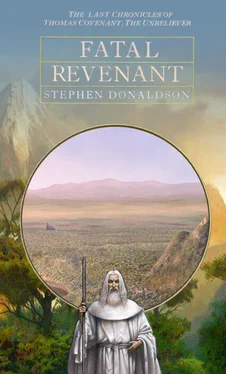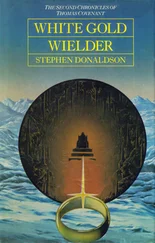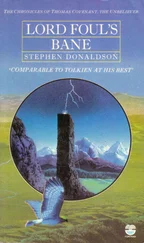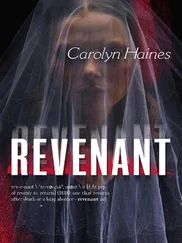Was it possible that events had forced a chink in the intransigence of Stave’s kinsmen?
But Stave shook his head. “Other matters aside, no Haruchai would willingly oppose the clear wishes of the Ranyhyn. Yet the Masters have altered neither their thoughts nor their commitments. They merely acknowledge that this disturbance of their service surpassed prevention. They could not have forestalled the battle, or the unveiling of powers unknown to the Woodhelvennin. By the measure of those forces, any experience of hurtloam and health-sense is a slight consideration.
“Also they acknowledge that they have failed.” Stave’s tone seemed to harden. “To prevent the misuse of Earthpower is but one aspect of their stewardship. Another is to preserve the Land’s peoples. The Masters do not fault themselves for their inability to defeat the forces arrayed against them. But when they have failed, their Mastery does not require that others must suffer. They accept no ease for their wounds because they have chosen the path of their service. They do not regret its cost. But the Woodhelvennin did not choose. Therefore they are not asked to share the cost.”
After a moment, he added, “When they have entered Revelstone, they will not be permitted to depart.”
Linden swore under her breath. But she did not protest. She had done so often enough, to no avail. Instead she said, “I still don’t understand, but that doesn’t mean I’m not grateful. These people have a long way to go. They’re going to need all the compassion that they can get.”
“Indeed,” assented Liand fervently.
“So tell me that I’m doing the right thing,” she continued. “Tell me that we don’t have to help them reach Revelstone. I need to get to Andelain. We’ve already lost a day here. But these poor people-”
“They will not be assailed,” Stave stated without hesitation. “There is no gain in their deaths for the Land’s foes. Neither Esmer nor the Harrow appears inclined to harm those who wield no power. And the Unbeliever’s son, his Cavewights, the skurj , and the Sandgorgons, all remain in the east. As we journey toward Andelain, we will ride between them and the Woodhelvennin, and will pose a far greater threat. Thus only the hazard of the kresh remains. But the carnage among them was extreme. If moksha Raver does not compel them, they will not soon crave human flesh.
“At another time, any Raver might revel in the slaughter of the helpless. But we seek Corruption’s doom. And you bear powers sufficient to endanger him. As we distance ourselves from the Woodhelvennin, we will draw moksha Jehannum after us.”
“And should Stave be mistaken,” Liand put in, “which I do not believe, there is another matter. After what has transpired here, no one among these folk will desire to delay your purpose. In this I am certain, for their hearts are open, and I have heard them speak among themselves. They are homeless and bereft, and their needs are many. But they have beheld the puissance of those who loathe the Land-and have seen you wreathed in a glory of fire and salvation. Also you have preserved the lives of their Heers. If you offered to accompany them, they would implore you not to turn aside from your intent.”
Linden did not look at either Liand or Stave: she did not want them to see that their assurances shamed her. If they had told her that every one of the villagers would die without her protection, she would have continued her journey nonetheless. She believed that she would never be able to rescue Jeremiah if she did not first reach Andelain; and so she would have abandoned the Woodhelvennin.
Linden, find me.
Everything came back to Thomas Covenant.
In spite of her shame-or because of it-she thanked the Stonedownor and the former Master. Then, as a kind of penance, she took the long walk away from the tree-dwellers and the battlefield in order to speak to each of the Humbled individually. She wanted to tell them that she valued what they had done.
That night, Linden’s company and the Woodhelvennin ate a communal meal organised by Quilla and Karnis. The Heers were still too weak to haul supplies, firewood, and cook pots themselves, or to prepare viands. Nonetheless they worked doggedly to ensure that none of the needs of their people were neglected.
Earlier, Linden and Bhapa had washed as thoroughly as they could in the brook. With Pahni’s help, and Liand’s, they had bathed Mahrtiir. And when the Ranyhyn had moved out into the gathering twilight to help the Humbled stand watch, Branl, Galt, and Clyme had taken turns at the stream, cleansing their injuries and their tunics with equal impassivity.
Now Linden, Anele, Liand, and the Ramen shared food with the villagers, sitting around several large fires. Linden was regarded with wonder-and attended diligently. Liand and the Ramen were given care as though it were a form of obeisance. And Anele was gently prevented from leaving his plate of stone: a restriction which he accepted without protest.
Mahrtiir sat cross-legged between Bhapa and Linden, feeding himself by touch. Apart from the ruin of his eyes, he had made an extraordinary recovery, healed by amanibhavam , hurtloam, and the Staff’s flame. In the firelight, his scars seemed almost metaphysical. He sat as straight as a spear, fiercely refusing any assistance that was not absolutely necessary.
Beside him, Bhapa slumped uncharacteristically, shoulders bowed in dejection; but Linden could not tell whether he grieved for his Manethrall or for Whrany.
Later, the Heers spoke briefly. In quavering voices, they described their sorrow over their lost homes, their relief that they could seek sanctuary in Revelstone, and their astonished gratitude for all that Linden’s company had done. Then, almost timidly, they asked her to explain what had befallen them.
She had no heart for the task; but Liand took it from her unasked. Standing among the fires, he emanated dignity and openness as he told the hushed Woodhelvennin what he knew. His version of the causes of the battle, and of the nature of the Land’s foes, was not what Linden might have said in his place. It was simpler and more direct; unconflicted by inadequacy or bitterness. But it was also better suited to the limited comprehension of his audience, and the villagers received it as if it were an act of grace.
With every word, he violated the long prohibitions of the Masters. Yet neither Vernigil nor the Humbled interrupted him. In this, as in the use of hurtloam, the Masters seemed to take pity on the Woodhelvennin.
Linden knew better. When the tree-dwellers entered Lord’s Keep, they would never leave. If that were pity, she wanted no part of it.
At last, the villagers prepared to sleep on beds of gathered leaves and retrieved blankets. In spite of Bhapa’s urging, Mahrtiir refused rest. Harshly he proclaimed that he had lost only his eyes, not his ears and nose, or the use of his limbs. Alone, he walked away from the fires, clearly intending to help the Ranyhyn and the Masters keep watch. For a moment, the ruddy light of the flames seemed to cling to the pale swath of his bandaged head. Then the night took him, and he was gone.
With anguish in his eyes, Bhapa followed the Manethrall.
When Linden was offered a bed, she paused only to confirm that Stave warded Anele. Then she sank into the blankets, tucked the Staff of Law under her arm, and fell instantly asleep.
During the night, she was tormented by nightmares, not of fire and killing, but of violation. She lay like carrion, unable to move, while centipedes and venomous spiders crawled over her face, emerging from her mouth and nose. Molten worms circled her eyes: noisome things crept unhindered through the privacy of her clothes: pincers and fouled teeth gnawed her flesh. The knowledge that they had been hatched in the dank cesspit of her heart filled her with horror.
Читать дальше












